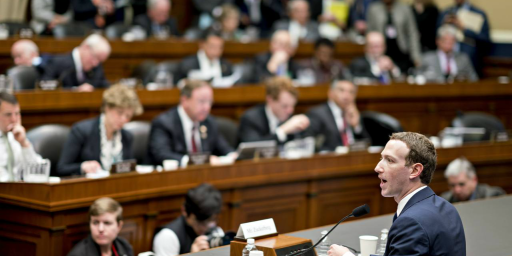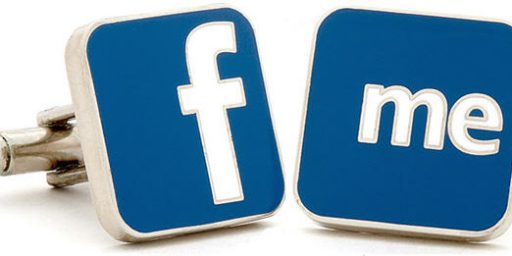A Question for Lawyers in the Audience (Social Media and Employees)
Ok, so does anyone have any legal insight into the question of whether an employer can ban its employees from connecting with one another via social media (e.g., Facebook)?
I can understand policies aimed at forbidding commentary about the workplace, but what about just stating that employees cannot, say, “Friend” other employees on Facebook?
And to be clear: this question has nothing to do with my employer, but is something that came up in a conversation and I am curious if anyone has any experience of knowledge with this.
My gut reaction is that such a policy would be an inappropriate extension of work policies into the private lives of the employees, but I am unsure of the legal implications.
An employer cannot (I would think) stop two employees from speaking (or being real friends) outside of work, so why would they be able to stop them from being virtual friends?






There is an old parallel in “outside work.” I am not a lawyer but I think employers were putting bans on what I could not do in my own hours which were not actually enforceable in the state of California. I didn’t sweat it because I wasn’t going to compete with my employer, and they weren’t actually going to poach unrelated work.
FWIW, I think these companies might be worried about something else, that proprietary company knowledge would migrate to an external network. I think that is a valid concern. You wouldn’t want an outsider learning product planning, for instance, by a Facebook hack, or even Facebook information bleed.
I think “no business communication on social media” might be a sensible boundary for companies that wanted it, rather than “no Facebook for you.”
That said, Skype was a great productivity tool at my last shop.
Note that normal employee termination procedures, locking doors, accounts, etc., is complicated when Facebook is part of the “system.”
@john personna: Let me note that FB usage at work is not the issue, nor is the potential for work product leaking out.
I would think it would be nearly impossible to enforce even if they tried to make a policy such as that.
Many years ago, before the advent of things like Facebook, a couple of brothers worked at the factory I work at. They were on different shifts, one was a supervisor and the other a machine operator. The plant manager at the time (who is no longer with the company) tried to tell them that they were not allowed to socialize with each other even outside of work. If I remember correctly his reasoning was becuase of one of them being a supervisor. It was really odd, and of course they both rightfully told him that was simply not an option – in not so polite a manner.
@Steven L. Taylor:
If you have special information about this employer in this specific case, perhaps so, but it’s easy to document the wider concern:
@john personna: I recognize that it is possible for any employee to reveal sensitive information about an employers (even if it a McDonald’s clerk letting slip that may be the back of the store isn’t quite as clean as it ought to be ).
However, the issue is not whether, to extend the example, two McDonald’s employees ought to be talking about work on FB but whether McDonald’s can forbid them from being friends in the first place and threatening the terminate them if the friended one another.
@Steven L. Taylor:
It seems non-fraternization policies are legal in my state:
I suppose an employer could claim a Facebook policy on that basis.
@john personna: Perhaps. But what you list seems to suggest a supervisor-subordinate situation. I am not sure how peer-employees being social acquaintances could result in an appearance of favoritism.
@Steven L. Taylor:
We have to read these lines like a lawyer ;-), though I am not a lawyer.
“Most fraternization policies cover only supervisor/employee relationship, and do not address relationships between co-workers, unless they affect the work.”
They say “most policies,” implying both that some might extend to co-workers, and that there is no boundary in California law that they cannot “address relationships between co-workers”
Securities regulations may require publicly-traded companies to impose preventative controls on their employees public communications to protect against a securities violation. I don’t think there is one definitive standard but the companies will require employees to sign agreements, and/or have staff that is constantly monitoring for employee communications on-line.
It depends on the state. In Pennsylvania, where I live, it would absolutely be fine for an employer to do as you suggest. This is an “at will” employment state, and the way I generally summarize the law for people is, “You can be fired for any reason or for no reason, except for a bad reason” – a “bad reason” meaning grounds like race or sex that are protected by federal, state, and (sometimes) local law. Forbidding employees from friending each other on Facebook – or even being actual friends who socialize in any way – would not violate any law or policy here that I know of.
This comment is not legal advice, and by commenting I have not created a law-client relationship with anyone. If you need legal advice, you should hire a lawyer to give it to you.
[D]oes anyone have any legal insight into the question of whether an employer can ban its employees from connecting with one another via social media (e.g., Facebook)? I can understand policies aimed at forbidding commentary about the workplace, but what about just stating that employees cannot, say, “Friend” other employees on Facebook?
Policies purporting to limit employees’ outside-the-workplace discussions are a violation of the National Labor Relations Act if the employees are discussing the terms and conditions of their employment (for example, if they are using Facebook in part to do that). Under section 7 of the NLRA (29 USC § 157), “[e]mployees shall have the right … to engage in other concerted activities for the purpose of collective bargaining or other mutual aid or protection.” Section 8(a)(1) of the NLRA (29 USC § 158(a)(1)) makes it “an unfair labor practice for an employer … to interfere with, restrain, or coerce employees in the exercise of the rights guaranteed” by section 7. An affected employee could file a complaint with the NLRB.
[Related: not infrequently, employers announce that it is “company policy” that employees can’t discuss their wages, salaries, or bonuses with each other. That is an obvious violation of the NLRA.]
More generally, New York Labor Law § 201-d bars employers from discriminating against employees based on “legal recreational activities outside work hours, off of the employer’s premises and without use of the employer’s equipment or other property.” There are a number of narrow exceptions, but the statute is quite general in application. Other states have similar statutory or common law restrictions on employer action relating to employees’ private lives.
I defer to the actual labor lawyer.